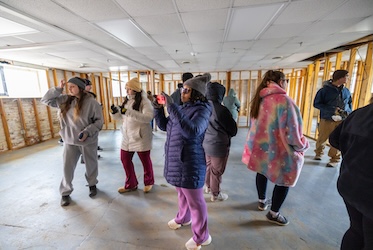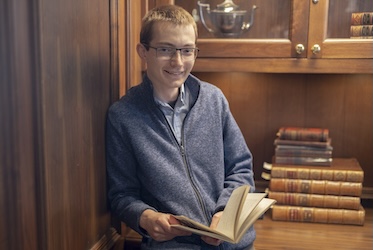
International delegation discusses government transparency
KENNESAW, Ga. | Feb 21, 2017
Officials from Egypt, Iraq and Tunisia get legal, political, communications perspectives
Drawing on the expertise of Kennesaw State University faculty members and president, a group of officials and academics from Northern African and the Near East heard perspectives on issues related to transparency in local, state and federal government during a U.S. State Department–sponsored tour.
As part of the International Visitor Leadership Program, the delegation of five representatives of government, NGO and academic institutions in Egypt, Iraq and Tunisia gained insights on transparency from the perspectives of four Kennesaw State experts in the areas of communications, law and political science.
Those perspectives were consistent with the leadership program’s objective of exploring ways to promote transparency and accountability in government. Organizers of the group’s U.S. tour expressed an interest in having participants meet with the Georgia First Amendment Foundation, a group of media lawyers, journalists and educators that promotes access to state and local government in Georgia. As a founder and officer of the Georgia First Amendment Foundation, Carolyn Carlson, associate professor of communication at Kennesaw State, was invited to host the delegation.
“When I saw what the objectives were for their visit, I knew I needed bring in President [Sam] Olens, who is an expert on Georgia's Open Records and Open Meetings Acts,” Carlson said. “We also had Kerwin Swint, chair of the Department of Political Science and International Affairs, talk to the group about his work as a board member of Common Cause, which works to promote honest, open, accountable federal and state government. Political Science Professor Ken White also spoke briefly about his experience with transparency issues in California, compared to those in Georgia.”
The Institute for International Education arranged the program’s U.S. tour to accommodate State Department’s specific objectives for the participants. The program seeks to:
· Examine the decentralized and self-regulating nature of U.S. federalism and how it promotes transparency in government;
· Explore the role of citizens, traditional and new media, academia, and civil society in fostering transparency and accountability in government;
· Highlight the mechanisms that enable citizens to foster good governance, ethical standards, and accountability at the local, state, and federal levels; and
· Analyze grassroots actions that have resulted in honest, transparent, and fair practices in government.
Program participants visiting Kennesaw State included Walaa Gadelkarim Mahmoud Osman, director manager, Partners for Transparency (Egypt); Ahmed Khorsheed Tawfeeq, spokesman for the Kurdistan Democratic Party in Kirkuk (Iraq); Fares Besrour, Chargé de Mission, head of government cabinet, Nadia Gouta Ep Hamdi, head of department and general directorate of regional development for the Ministry of Development, Investment and International Cooperation, and Bassem Karray, associate professor of public law, Higher Institute of Legal Studies, University of Gabes (Tunisia).

From left, Walaa Gadelkarim Mahmoud Osman; Barbara Gainey, director, School of Communication and Media; Carolyn Carlson; Robin Dorff, dean, College of Humanities and Social Sciences; Ahmed Khorsheed Tawfeeq, KSU President Sam Olens; Fares Besrour; Nadia Gouta Ep Hamdi; and Bassem Karray.
Related Stories

Kennesaw State architecture, engineering students reimagine Asheville's devastated River Arts District

First-year Kennesaw State student, author recognized as versed local historian

Kennesaw State student leverages Double Owl Pathways program to accelerate career path

Kennesaw State student uplifts community through film work, fellowship
A leader in innovative teaching and learning, Kennesaw State University offers undergraduate, graduate, and doctoral degrees to its more than 47,000 students. Kennesaw State is a member of the University System of Georgia with 11 academic colleges. The university’s vibrant campus culture, diverse population, strong global ties, and entrepreneurial spirit draw students from throughout the country and the world. Kennesaw State is a Carnegie-designated doctoral research institution (R2), placing it among an elite group of only 8 percent of U.S. colleges and universities with an R1 or R2 status. For more information, visit kennesaw.edu.














